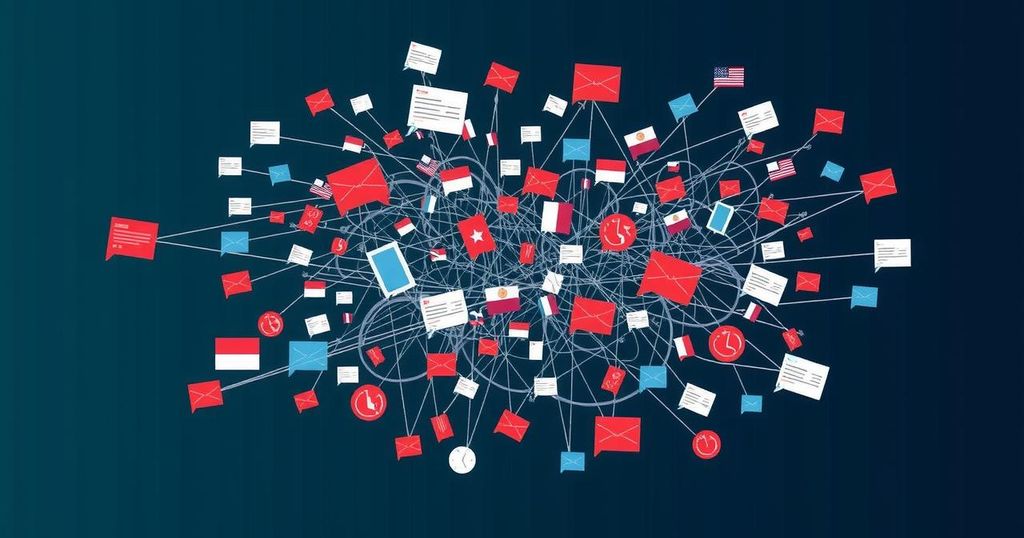The article discusses the alarming increase in election disinformation, particularly as the upcoming election nears. Influential figures such as Trump and Musk propagate dubious claims, and the environment for conspiracy theories is particularly favorable due to legal actions against disinformation efforts and reduced social media moderation. This disinformation not only affects public perception but poses real-world risks to officials and the electoral process itself.
The current political landscape is fraught with the proliferation of disinformation, particularly as the upcoming election approaches. Prominent figures, including former President Donald Trump, Elon Musk, and Representative Marjorie Taylor Greene, have been observed disseminating misleading information, especially in relation to natural disasters such as hurricanes and election processes. These instances serve as a precursor to the anticipated escalation of disinformation leading up to and following Election Day. Elaine Godfrey, a journalist covering politics, notes that the environment for the spread of conspiracy theories is more favorable than ever, driven by legal actions against institutions combating disinformation and the diminished content moderation from major social media platforms like X and Meta. Furthermore, the involvement of foreign entities in U.S. affairs and advancements in generative AI contribute to this chaotic atmosphere. The nature of recent disinformation campaigns has become increasingly outrageous, with some claims lacking any basis in reality. There are numerous examples, such as accusations that Democrats intentionally directed hurricanes towards Republican strongholds and unverifiable reports of FEMA’s intentions concerning disaster relief. Looking ahead, as Election Day nears, disinformation is expected to manifest in particularly bizarre forms, potentially affecting not only the election itself but also the perception of its legitimacy among the electorate. The implications of such disinformation extend beyond mere public opinion; it poses tangible risks to individuals involved in disaster response and election processes. For instance, FEMA officials have experienced threats due to the harmful rumors proliferating online, while election officials face pressure stemming from unfounded claims about the integrity of elections, further complicating their roles. A chilling consequence of this disinformation is a deteriorating trust in democratic institutions, leading many citizens to question the fairness and security of election outcomes. Elon Musk’s influential role in enhancing the visibility of disinformation cannot be overstated. With millions of followers and a social media platform that prioritizes his posts, Musk has facilitated the spread of misleading narratives, including unfounded allegations regarding voting technology. Despite past lessons highlighting the repercussions of misinformation, the potential for future chaos looms as the election approaches. In summary, the convergence of weakened regulatory frameworks, rampant sensationalism, and advanced technology creates an environment where disinformation thrives. While there is a greater awareness compared to previous elections, the potential for significant disruption remains. Entities engage in critical thinking and verification are urged to mitigate the impact of these harmful narratives while promoting an informed electorate that recognizes the factual integrity of the electoral process.
The article addresses the contemporary challenges associated with election-related disinformation, particularly how influential public figures contribute to the spread of falsehoods on social media. It highlights the increasing chaos stemming from legal actions targeting organizations combating disinformation, diminished content moderation from major social media companies, and the involvement of foreign adversaries. The article also examines how disinformation affects public perception regarding elections and disaster response, emphasizing the urgency of addressing this phenomenon as elections approach.
The landscape of election disinformation is marked by unprecedented chaos, exacerbated by influential figures who amplify misleading narratives. As the election draws closer, the potential for disinformation to distort realities and erode public trust in democratic processes poses serious risks. It is essential for individuals and organizations to remain vigilant, scrutinize the information presented online, and foster an electorate that values truth and factual integrity in political discourse.
Original Source: www.theatlantic.com






